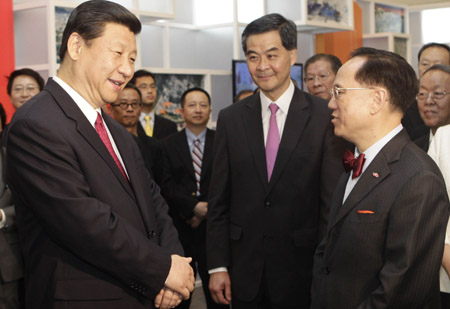
|
 |
|
Vice-President Xi Jinping, accompanied by Hong Kong Chief Executive-Elect Leung Chun-ying, talks with Hong Kong Chief Executive Donald Tsang at the National Museum of China in Beijing on Wednesday. The museum is featuring an exhibition celebrating Hong Kong's achievements in the past 15 years. [Photo/China News Service] |
The central government said on Wednesday that it will encourage foreign investors to use China's currency to conduct trade settlements and investment in Hong Kong.
The central government will also push forward joint ventures for stock exchanges in Hong Kong, Shenzhen and Shanghai, as well as introduce exchange-traded funds on both the Hong Kong and mainland stock markets.
The moves are part of a package of policies for Hong Kong ahead of the 15th anniversary of its return to China on July 1.
The development of Hong Kong's offshore yuan businesses accelerated rapidly last year, as the total yuan trade settlement value in Hong Kong increased more than four times over 2010, the Hong Kong Monetary Authority said in a document released in late February.
As a prime platform for offshore yuan trade settlement, Hong Kong's banks handled a record 1.91 trillion yuan ($300 billion) in such trade last year, up 419 percent from 369.2 billion yuan a year earlier, said the city's de facto central bank.
In 2011, China's trade settled in yuan amounted to 2.08 trillion yuan, which was about 9 percent of the country's total imports and exports for the year, according to the People's Bank of China.
ETFs to get welcome
Meanwhile, the long-awaited issue of ETFs that track Hong Kong shares and those that are linked to A-shares are widely expected with an initial quota of 20 billion yuan each.
Analysts said that they don't believe the ETFs will be able to boost stock markets single-handedly. They said the move is more of a policy signal rather than a decisive factor for the markets.
Tse Kwok-leung, head of economics and policy research at Bank of China (Hong Kong), said he doesn't see the introduction of new ETFs stimulating the stock markets. The current stock market downturn is a result of a weak global economy, said Tse, adding that the recovery of the stock market needed to be backed by the recovery of the real economy.
But Tse believes investors from both the mainland and Hong Kong will be very interested in the approaching ETFs, "as they will provide a direct access to each other's bourse for stock trading".
Tse said although the actual initial scale of the ETFs is yet to be unveiled, the cooperation in financial markets between mainland and Hong Kong has always been step-by-step, and the scale will be expanded gradually.
The ETFs are expected to get a warm welcome by investors.
Ronald Wan, honorary chair professor at the Renmin University of China, also believes that Hong Kong branches of mainland brokerages will share the quota of A-share tracking ETFs. "They will have certain advantages in developing yuan-denominated products, due to their background," he said.
As for the joint ventures for stock exchanges in Hong Kong, Shenzhen and Shanghai, Chen Daofu, an economist at the State Council's Development Research Center, believes the collaboration could be in the areas of risk management, product design and trading system operation, which can change the current competition into a cooperative relationship.
Contact the writers at litao@chinadailyhk.com, sophiehe@chinadailyhk.com and chenjia@chinadaily.com.cn


 Washington to remain focused on Asia-Pacific
Washington to remain focused on Asia-Pacific RQFII target blue chips amid bear market
RQFII target blue chips amid bear market Australian recall for top two exporters
Australian recall for top two exporters China fears new car restrictions
China fears new car restrictions